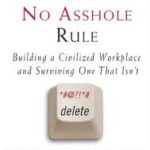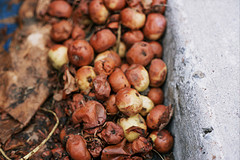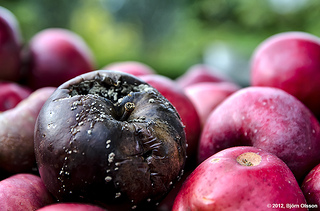
Photo Credit: – bjornsphoto -, Creative Commons
One Bad Apple Spoils the Whole Bunch.
There’s a reason that this saying has survived for so long.
It’s true – for apples and for people.
Research shows that negativity is infectious and leads to rotting of moods, well-being, physical health, and relationships.
A 2010 New York Times article found that one Bad Apple in the workplace can bring down an entire group. “…Group members devote more energy to dealing with the bad apple and less energy to the task at hand. Moreover, anger and hostility are contagious, so the whole group can become infected.”

No Assholes Rule – Bob Sutton
The widespread popularity of Bob Sutton’s blog and resonance of his book, The No Asshole Rule: Building a Civilized Workplace and Surviving One That Isn’t clearly shows that lots of people are struggling with Bad Apples at work.
The costs? People are damaged, strong employees leave, sick days increase, and productivity, work quality, and contribution suffer.
Simply put, misery likes company. If Bad Apples don’t find other Bad Apples, they’ll simply rot some good ones.
Bad Apple: Trait or State?

The whole bunch, spoiled.
Photo Credit: fortinbras (Creative Commons)
These findings can seem depressing.
It’s no fun to encounter one Bad Apple, let alone be surrounded by them.
But let’s stop for a moment and make a distinction: Bad Apple as a trait versus a state. The difference is a critical one.
Some Bad Apples are chronically nasty. They bullied, tormented, and manipulated back on the playground and have continued throughout their life.
In this case, Bad Appleness is a trait. Traits endure across time and situations. They become part of one’s character. When trait-based Bad Apples see an opportunity for advantage or feel like their ego is being threatened, they will behave… well, like an asshole.
Simply put, being a Bad Apple is in their nature. Without massive effort, these people belong in the ‘once an asshole, always an asshole’ category.
When Bad Apples Are a State of Mind
I believe, however, that most of the time when we encounter someone behaving like an asshole, they’re exhibiting a state, not a trait.
Said another way: for most people, Bad Appleness depends on the situation.
Think about it for a second:
How many Bad Apples do you know that consistently act like an asshole across nearly all situations, places, and time?
Have you ever found out that a person you like and respect has had a positive experience with someone you thought was an asshole – or vice versa: that other people think your Good Apple friend is a jerk?
Have YOU ever infected a group with negativity or divisiveness?
My Name is Mary Beth, and I Have Been a Bad Apple

Photo Credit: !PnP (Creative Commons)
Let’s face it: it’s a helluva lot easier to see the Bad Apples around us. But if most Bad Apple experiences are situational and not characterological, it means we all have the potential to be a Bad Apple at one time or another.
So here goes: I have been a Bad Apple. More than once.
Ouch.
In the interests of space, I’ll limit this confession to one particular incident.
When my marriage was imploding (and along with it my identity and self-image), I was filled with fear, anxiety, anger, and sadness, to name a few. I had severe insomnia and was neither eating healthy nor exercising. I was under a lot of pressure at work, with some very high-stakes projects, long hours, and a new boss.
I was also a very Bad Apple.
I am not an asshole by nature. If you’d only known me during this time, however, you’d have likely thought me one.
Learning from My Good Apple Gone Bad Experience

Photo Credit: Ed Yourdon, Creative Commons
Afterward, my Bad Apple behavior left me feeling sad, embarrassed, and ashamed. Since I don’t like regrets, I knew that the only way to transform this was to learn something.
I had the perfect storm of Bad Apple Factors: stress, fear, and insecurity. Instead of dealing with these, I fed them.
I didn’t ask for help. I knew I felt awful, but I didn’t want people to know how intolerable my marriage had become, nor did I seek professional help.
I failed to pay attention to what must have been obviously glaring clues that I was at best unpleasant and at worst noxious to be around.
Last but certainly not least, I let negativity become a habit. I saw only the worst in every situation – and told people all about it. I quickly trained my brain to attend to what was wrong, rather than what was right, and it eagerly obliged.
It was only when I finally recognized that I needed some help – and got it (at work, from friends, and a fantastic therapist) that things shifted, until I gradually returned to my typically Good Apple state.
How NOT to Be a Bad Apple or One of the Spoiled Bunch

One of the best resources available. Seriously excellent.
If you’re worried you might be a characterological Bad Apple…
…Take the ARSE quiz to find out. My guess is, however, that if you’re the least bit concerned, you’re probably not an asshole. If you were, you wouldn’t care. You might even be proud. Yuck.
If you encounter a true asshole…
…Your best course of action is to limit your exposure and read Bob Sutton’s book ASAP. You’ll need it.
I also can’t recommend Difficult Conversations, by Douglas Stone and colleagues more highly. This book is a priceless resource for how to have difficult conversations with anyone, from your beloved family to a heinous boss. It is fantastic.
If you want to avoid entering a Bad Apple state or becoming part of the spoiled bunch…
…Follow these four steps:
- Awareness. Simply being aware of the potential for being a Bad Apple or contaged by one is extremely important. The start of a Bad Apple infection can be gradual or insidious, and it’s best caught early.
- Empathy. Before you rush to judgment, remember that we all have the potential to be a Bad Apple in a given situation or time. That doesn’t mean you have to like or condone someone’s behavior, but if you rush to judgment, you lose the opportunity for understanding.
- Reach Out. If we come from the perspective that most Bad Apples aren’t that way by nature, we have a huge opportunity to prevent or stop the spoilage. That Bad Apple down the hall may be struggling with a life crisis. Or they may not be aware of their impact on others. While there’s no guarantee that they’ll be receptive, isn’t it worth a try?
- Take Responsibility. While it’s nice if someone else reaches out, the fact is, we are all 100% responsible for our attitude and behavior. Watch for signs of stress. Notice people’s reactions to you. Solicit feedback. Get support. Seek help when you need it. And learn from this so you can stop it from happening again.
The best way to avoid getting a cold is to routinely wash your hands, and the best way to avoid spreading one is to cover your mouth when you sneeze (and then wash your hands).
The same goes for Bad Apple contagion. You have the power to avoid being a Bad Apple by regularly monitoring your thoughts, attitudes, behaviors, and their impact. You can stop the spread of one by making a conscious decision not to follow a negative leader.

Honey Crisps. Yum… Photo Credit: Muffit (Creative Commons)
A Parting Wish
May you and your bunch be Good Apples as much as possible – deliciously fresh, unspoiled, sweet Honey Crisps.
~~~~~~~~~~~~~~~~~~~~~~~~~~~~~~~~
I’d love to hear your reactions and comments.
How have you effectively handled Bad Apples?
Have you ever been one? How did you turn it around?
If you like this post, please share it using the buttons at the top. The best compliment is a referral. 🙂
Sign up for my mailing list by scrolling below, so you never miss a post.
Thanks!


Yes, yes, yes, so true!! I’m excited to have read this Mary. Being aware of where our thoughts are at the moment and even where they’re going can prevent going into the ‘bad apple’ side of things. I’ve been a bad apple myself and have caught myself in the act too. Right after, I go within to figure out where it’s all really coming from. The moment I make a shift, I personally feel lighter.
Thanks for that, Daisy – so important to go within. And sometimes I find that quite difficult because I have to look at things that are ugly or make me uncomfortable. But it is always worth it in the long run. I agree – it makes me feel lighter, which is a huge relief when realizing I may have affected others with negativity…
Bad Apples are out there and I do my best to steer clear of them. And I’ll be the first to admit that I’ve had my own Bad Apple moments. A few years ago I was dealing with marriage, work and financial stress and I was walking my dog through the neighborhood when someone else’s dog ran out and attacked my dog. The owner of the attacking dog came out and apologized but I was a ticking time bomb and I let my neighbor have it. Hateful words spilled out of me and didn’t stop. The woman was crying and I kept going and going and verbally attaching her for her lack of responsibility and I called her some very ugly names. I later apologized but the damage had already been done and she never spoke to me again. I learned from this event that I always have a choice in how I respond to any situation and that my reaction will have a ripple effect into the the world. I want my ripple effect to be one of love and compassion. Thank you for allowing me to reflect on the impact we have on the people around us. It’s always a choice and I choose to be a Good Apple! 🙂
Thanks so much for sharing that story, Michael. What a learning experience! It shows not only that our actions have consequences but also that we can choose to grow from these ‘negative’ experiences so that they can be transformed. The ripple effect is so powerful – I was just noticing this yesterday when a woman ahead of me held the door for the guy behind her and smiled. He in turn held it for me and smiled, and then I did it for the person behind me and looked back to see it continue to the next person, at which point there was no one else coming out the door. I know I’d been very tired and out of it before that but having experienced the simple kindness of a door-holding and smile and then being able to pass it on gave me quite a lift. If it did the same for everyone else in the chain and then we take that into our day, who knows how many people could have been positively affected… 😀
So true! Most assholes are not inherently so. It’s all about circumstance. I’ve definitely been an asshole, and even worse, it was generally to those closest to me (family, partner) instead of the general public, they always got sunshine and roses, I don’t know why?
And since negativity and asshole behaviour is certainly contagious (we’ve all seen it spread like wildfire) your checklist is great for exterminating it rapidly!
I regularly check in on my actions/behaviours/mindset… I know our thoughts create a ripple effect (they contain energy) and what I think/feel is attracted into my world, so at the end of the day, the more positive I am, the less bad apples I’ll encounter. Great post!
Such a great point, Erica – the bunch we often spoil is our nearest and dearest. Perhaps that’s because they’re more likely to take it and stick around than others (although I wouldn’t want to test that, as there could be a limit I don’t want to hit). Also, I find that I am often overly concerned with what the general public thinks of me, which is something I’ve been working for quite some time and probably will continue to do so.
As for the contagion, nothing puts me in check quite so quickly as seeing that I’ve caused someone to go from being happy / excited / sunshiny to bummed / sad / irritated / angry. It makes me feel terrible to know I’ve caused that – and puts the responsibility on me to check in, as you so rightly say, with my actions, behavior, and mindset. Thanks for your comments!
Thank you so much Mary Beth for clarifying the difference between those that are bad apples and those that are good apples (that are temporarily bad depending upon the situation).
That is so true and we can all be bad apples at some point in time – but the goal is to not be!
Thank you for the book recommendations and the simple steps to not becoming one!
Thanks, Wendy! I think it’s a huge distinction to recognize that we all have the potential. It helps us have more empathy for others and hopefully minimize the negative impact. I can’t recommend Difficult Conversations more highly – it’s fantastic! 🙂
Is it wrong that “ARSE” test made me laugh out loud? 🙂 Are there people who are always good apples? It seems like everyone runs the risk of being a bad one at some point (although I may be telling myself this just to feel better about KNOWING I’ve been one…). Great post. I need to get caught up on your blog pronto!
Hmmm…. Are there people who are always good apples…. Maybe the Dalai Lama. He’s about the only one I can think of off the top of my head. I think we’ve all had these moments, which is why it’s important to do our own work (like calling our coaching buddy!) so we don’t take it out on others. Moods are incredibly contagious. Thanks so much for writing! 🙂